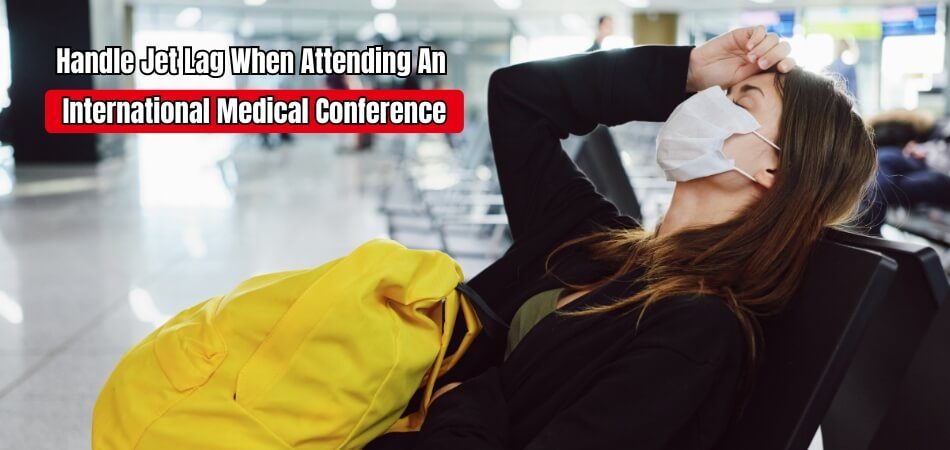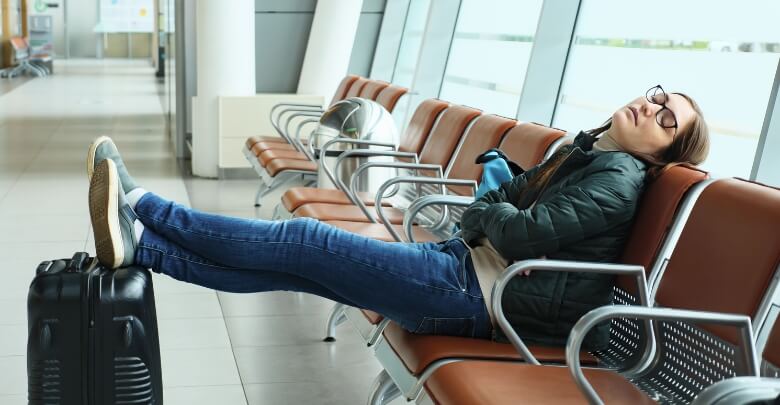An international medical conference offers exceptional opportunities for learning, networking, and professional development. However, crossing time zones can bring the challenge of jet lag, which may impact your ability to participate fully. Being aware of how do I handle jet lag when attending an international medical conference is essential for maximizing your conference experience.
A good way to manage jet lag while attending an international medical conference is to quickly adjust your sleep schedule to the local time zone. You can reset your internal clock by staying hydrated and getting enough sunlight exposure.
There are many ways to manage jet lag. For more details on prevention strategies, you can read our detailed article.
Common Causes of Jet Lags
The effects of jet lag can disrupt even the most meticulously planned trips, especially if you have to cross multiple time zones to attend an international healthcare event such as the Canadian medical conference. Managing and minimizing its effects requires an understanding of the common causes. Here’s a look at some key factors that contribute to jet lag.
- Time Zone Crossings: Your internal clock struggles to realign when you travel across different time zones. This misalignment causes jet lag symptoms.
- Irregular Sleep Patterns: When sleep routines are disrupted before and during travel, jet lag symptoms are increased.
- Limited Sunlight Exposure: Sunlight is essential for resetting your internal clock. Lack of exposure can delay adjustment to new time zones.
- Dehydration: Air travel can lead to dehydration, which intensifies jet lag effects. This is a common issue on long flights.
- Prolonged Inactivity: Sitting for long periods during flights limits physical activity, affecting the quality of sleep and the functioning of the body.
- Diet Changes: Changing your eating habits and meal times while traveling can further confuse your body’s rhythms. Jet lag is caused by this as well.
Even the attendees of a rich and cultural event can fall for jet lag as a result of long sessions. For instance, if you are planning to join the upcoming medical conferences 2024 you must learn the ways to handle jet lag to avoid disrupting the conference experience. These conferences can take longer sessions, causing many to fall for this issue. Be prepared by learning the steps below to handle jet lag.
How Do I Handle Jet Lag When Attending an International Medical Conference?
International medical conferences provide an opportunity to discover the latest advancements and network with other medical professionals. While traveling across time zones can present some challenges due to jet lag, it can also prevent you from fully participating in the event. Here is a step-by-step guide to handling jet lag effectively so that you are alert during your conference and can make the most of your time:
Step 1: Adjust Your Sleep Schedule Beforehand
You can start by adjusting your sleep schedule a few days before departure. Gradually shift your sleeping and waking times closer to your travel location. This can result in less jet lag upon arrival and easier and quicker adaptation to the new routine.
Step 2: Stay Hydrated During Your Flight
Dehydration can increase jet lag symptoms. Make sure to drink plenty of water before, during, and after your flight. To maintain your energy levels, you should avoid alcohol and caffeine, which can lead to further dehydration and disrupt sleep patterns.
Step 3: Set Your Watch to the Destination Time Zone
When you board your flight, set your watch to the time zone of your destination. It helps your mind adjust to the changed schedule and makes the transition smoother. Acting as if you are already in the new time zone can also help minimize jet lag’s psychological effects.
Step 4: Use Natural Light to Adjust Your Body Clock
The exposure to natural light can help reset your internal clock to the local time. When you’re at your destination, try spending time outside during daylight hours, especially in the morning. This is particularly effective in reducing sleepiness and helps sync your biological rhythms.
Step 5: Follow the Local Eating and Sleeping Schedule
Once you arrive, adopt the local eating and sleeping schedules. When you eat meals at local times, your body’s internal clock is regulated. Craft a plan to make the most of the medical conference while aligning with these new timings, which can improve your social interaction and participation.
Step 6: Avoid Long Naps During the Day
Take a short nap (no longer than 20 minutes) if you feel exhausted when you arrive. Many doctors often overlook this important strategy, which is one of the common mistakes doctors make at conferences. Avoid long daytime naps, as they can make adjusting to the new time zone more difficult and prolong jet lag symptoms. Stay awake instead by engaging in light activities.
Step 7: Consider Using Melatonin
Consider taking melatonin supplements if you are having trouble adjusting your sleep schedule. Melatonin can help regulate your sleep-wake cycle; however, you should consult your healthcare provider before starting a new supplement regimen. This is especially useful when your stay is short and you need to get back to your best as soon as possible.
How Does Jet Lag Affect Your Body?
Traveling across time zones messes with our internal clock, leading to jet lag. This physiological condition affects different aspects of your health and well-being, including your mood. Recognizing how jet lag impacts your body is key to managing its effects and maintaining a smooth travel experience. Below is a detailed explanation.
Sleep Disruption
A jet lag disrupts your internal sleep-wake cycle and makes it difficult to fall asleep. This misalignment often leads to difficulties falling asleep and staying in bed. Waking up too early or at irregular times affects your rest. Overall, this results in reduced sleep quality, leaving you unrest.
Digestive Issues
Jet lag disrupts meal timing and leads to digestive discomfort. The misalignment can lead to indigestion and a change in appetite, which makes eating difficult. Also, you can experience stomach upset, constipation, or diarrhea. It may be possible to alleviate these problems by managing meal times according to local hours.
Mood Fluctuations
A jet lag can adversely affect your mood, leading to irritability and anxiety. Even small inconveniences may trigger unusually strong emotional responses during this period. Some individuals might experience extreme mood swings or a general feeling of sadness. These emotional changes can affect social interactions and travel enjoyment.
Cognitive Decline
The effects of jet lag can impair cognitive functions and make it difficult to focus and process information. This includes difficulty maintaining concentration, a lack of alertness, and a loss of short-term memory. As a result of cognitive declines, making decisions becomes much more difficult, and this can affect your performance at work and during activities that require decision-making.
Physical Weakness
You might notice muscle weakness and stamina loss, which may limit your ability to perform planned activities and hinder getting the most out of medical conferences. Headaches and general unwellness are also frequent symptoms. These physical symptoms can make it challenging to engage in intense activities or attend long-term conference sessions.
Does Everyone Experience Jet Lag in The Same Way?
No, everyone does not experience jet lag in the same way. The impact of jet lag varies widely from person to person. Factors like age, overall health, and travel habits influence how strongly one feels the effects. Some people might bounce back quickly after crossing several time zones, while others might struggle for days.
The direction of travel also plays a major role in how jet lag affects individuals. Traveling east causes more severe jet lag than traveling west. This is because advancing your body clock is generally harder than delaying it. Consequently, those flying east might find it difficult to adjust than those heading west.
Aside from that, individual sleep patterns can determine how one experiences jet lag. People with inflexible sleep routines often have difficulty adjusting to new time zones. Conversely, those with more flexible sleeping habits might adapt more swiftly and experience milder symptoms.
When Do You Need to Seek Medical Advice for Jet Lags?
A common experience for travelers crossing multiple time zones is jet lag, which is usually uncomfortable for a short period. While it usually resolves on its own, medical advice may be necessary in some cases. Listed below are some conditions in which you should consider seeking professional assistance:
- Persistent Symptoms: If jet lag symptoms persist longer than expected, it’s advisable to consult a healthcare provider. The presence of fatigue and dizziness for more than a week needs to be evaluated.
- Severe Sleep Disruption: When sleep disturbances are severe and prevent you from resting for several nights, medical advice may help.
- Intense Physical Symptoms: A visit to a doctor is recommended if physical symptoms such as nausea, headaches, or dizziness occur. These symptoms can indicate underlying conditions brought on by jet lag.
- Mental Health Impact: When you experience significant mood changes due to jet lag, it would be beneficial to seek professional assistance. It is important to pay attention to mood disturbances that last for a long time.
- Pre-existing Medical Conditions: Travelers with pre-existing health conditions should consult their doctor before international travel. Adjusting medication schedules or managing symptoms may need professional input.
- Medication Questions: If you are considering taking sleep aids or melatonin for jet lag, speak to your healthcare provider first. They can advise on safe usage and possible interactions with other medications.
Frequently Asked Questions
Jet lag can be a significant hurdle when attending an international medical conference. Understanding how to manage it effectively will enhance your experience and productivity. Here are some frequently asked questions to help you navigate this common travel challenge.
Is It Helpful to Stay Active During the Flight to Reduce Jet Lag?
Yes, staying active during the flight can help improve circulation and reduce stiffness. Taking short walks up and down the aisle and stretching in your seat can keep your body engaged. Performing simple exercises also promotes blood flow, which is essential for reducing the risk of blood clots. Incorporating movement into your routine during long flights can make a noticeable difference in how you feel upon arrival.
How Long Does It Usually Take to Recover from Jet Lag?
Recovery time varies among individuals, typically taking a few days to a week after arrival. Factors such as age, overall health, and travel distance can influence how quickly you adjust to the new time zone. Some people may adapt faster than others, depending on their body’s natural rhythm. Being aware of these variations can help you set realistic expectations for your recovery.
How Can I Support Recovery from Jet Lag After Returning Home?
Allow yourself time to readjust to your home time zone by gradually reintroducing your regular sleep and meal schedules. Maintaining a balanced lifestyle post-travel is crucial to supporting your body’s recovery. Try to avoid caffeine and heavy meals close to bedtime to help improve sleep quality. Staying hydrated and engaging in light exercise can also aid your adjustment.
Are There Specific Foods or Supplements that Can Help with Jet Lag?
Incorporate foods rich in tryptophan, such as turkey, nuts, and seeds, to aid in the production of serotonin and melatonin, which support sleep regulation. Staying hydrated with water and herbal teas can also help you feel more alert and rested. Consider using natural supplements like melatonin, but consult a healthcare professional before use. A balanced diet can significantly impact how well you cope with jet lag.
Can I Use Technology to Assist in Managing Jet Lag?
Yes, there are mobile apps and wearable devices that can help track sleep patterns, monitor light exposure, and provide personalized recommendations. These tools can optimize your sleep environment and help you adjust to new time zones more effectively. By using technology to assist in managing jet lag, you can mitigate its effects and enhance your overall conference experience.
Final Thoughts
When traveling for international medical conferences, jet lag can make you unable to fully participate in the event. It is possible to mitigate jet lag’s effects by adjusting your sleep schedule in advance, staying hydrated, and planning your daily schedules for the local time.
As we discussed in “How do I handle jet lag when attending an international medical conference?” staying hydrated and adhering to local eating times will help reset your internal clock. Aside from that, taking short naps and possibly using melatonin, under a doctor’s advice, can help adjust your sleep cycle.
Keep in mind that everyone experiences jet lag differently, so it’s important to know your body’s needs and prepare accordingly. This will enable you to make the most of your conference experience.








